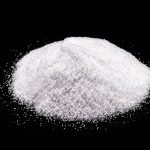Potassium lactate is rumored to contain dairy, milk, and lactose. But are the rumors true?
Potassium lactate does not contain milk, dairy, or lactose. It has lactic acid that is combined with potassium to form a salt. It is also not an allergen and lactose-intolerant people can consume it. It is also a safe preservative as classified by USDA.
So, how is lactic acid processed if that is the case? Discover the answer below!
Is Potassium Lactate A Dairy or Milk Product?
The term “lactate” can sometimes make people with lactose intolerance or milk allergy look the other way. But this should not be the case with potassium lactate.
I know, chemistry classes back then were probably not the most interesting subject for some, and taking a trip down memory lane today is not necessary. But you will encounter some scientific terms.
Potassium lactate is not related to milk and other dairy products. Potassium lactate is made from potassium (base) and lactic acid (acid) (source: Food Construed).
Lactic acid can either be natural or synthetic. Either way, when added to potassium will form the compound potassium lactate.
Lactic acid is naturally found in dairy products such as yogurt or fermented products such as sauerkraut. If lactic acid is used commercially, like in potassium lactate, it will be for the purpose of making it into a food additive.
There are 2 ways to do this. First is by fermentation of carbohydrates. The second one is a chemical process together with hydrolysis (source: Encyclopedia of Food Sciences and Nutrition (Second Edition).
These are quite technical terms, but the point is that potassium lactate has no milk protein (source: Food Construed), which means it is not a dairy or a milk product.
So, if you are feeling skeptical about potassium lactate-containing dairy or milk for that matter, don’t be. Potassium lactate is not an allergen. Moreover, as a food preservative, potassium lactate is classified as Generally Recognized as Safe (GRAS) by the USDA (source: USDA).
Does Potassium Lactate Have Lactose in it?
Lactose and lactate are not the same thing, nor are they related. This is because lactose is the sugar of dairy products. Lactate, on the other hand, and in this case, is a salt compound.
As discussed above, lactate will be formed if lactic acid is added with a basic or alkaline elements such as potassium. If lactic acid is mixed with potassium, the result is potassium lactate. If lactic acid is combined with sodium, the result is sodium lactate, and so on.
Lactate from lactic acid does not contain any lactose (source: Lactose Intolerance: Shopping tips for lactose-intolerant people). This implies that you can still have potassium lactate if you are lactose intolerant.
We hope you found this article informative, even if it’s a little scientific!
If you’re curious about potassium lactate and its safety for consumption, explore our article that offers a thorough examination of its potential risks. This could be an invaluable resource for enhancing your understanding.







Comments are closed.